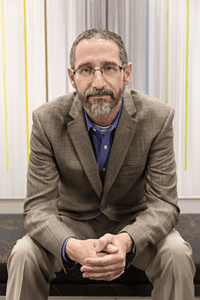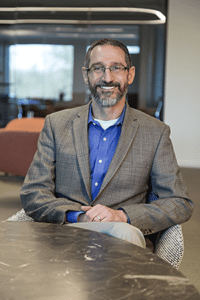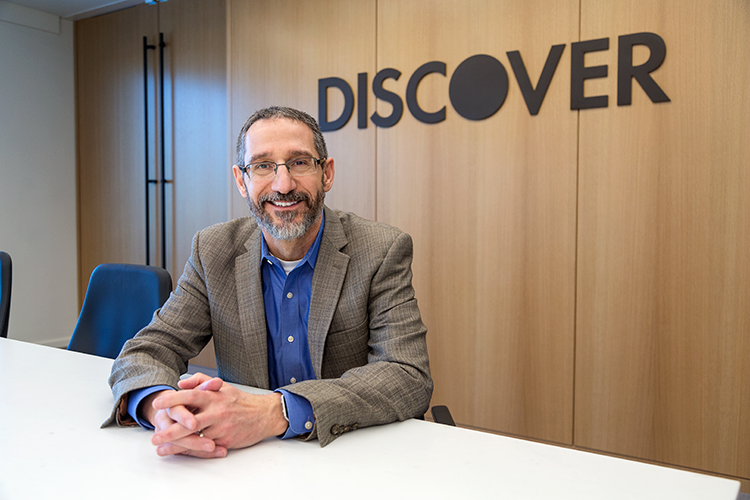When it comes to learning, Jon Kaplan truly understands the importance of emotional engagement. Growing up south of San Francisco, the self-described “terrible student” found himself, in the fourth grade, unable to read — but hid it from everyone he knew, including his teachers. “I was really good at faking people out,” he said. “I was able to pay attention to social cues, and I learned how to cheat on multiple-choice tests.”
Kaplan finally confessed his secret to a classmate and got the remedial help he needed, but by then he had become “incredibly ashamed” and his academic performance suffered through grade school.
However, that all changed when Kaplan made a new friend in high school — one who “was very driven academically,” he recalled. “And I remember a light went off in my head: ‘Oh, I can try.’ I started trying, and I did really well after that.”
Inspired and motivated, Kaplan went on to attend Stanford University, where he earned a bachelor’s degree in international relations and a master’s in international policy, followed by an MBA from the University of California Berkeley’s Haas School of Business.
“I got that input that if you try hard, it’s actually more fun,” said Kaplan, who now serves as vice president of training and development for Discover Financial Services in Riverwoods, Illinois. “You’re more engaged; it’s more interesting.”
It is this focus on emotional engagement, paired with a genuine humility and openness to feedback fostered by his early childhood experiences, that define Kaplan and his approach to learning today.
“He is humble and open-minded, and that helps bring multiple ideas to the table and creative resolutions to problems,” said Teri Hart, director of learning strategy at Discover. “He has a growth mindset about himself as well as about others, and he sees everyone for their potential.”
The Road to L&D
Now a 25-year veteran of the L&D industry, Kaplan always pictured himself in the learning space — just not the corporate learning space. Having been bitten by the academia bug en route to Stanford, he had his sights set on becoming a college professor. But he soon discovered that while he enjoyed teaching undergraduates, he didn’t enjoy other aspects of higher education. So after earning his master’s, Kaplan switched gears and turned to high school education, spending a few years teaching economics, government and U.S. history in several California schools. He even became a founding member of a charter school and led the institution for about two and a half years, but he soon concluded that the learning wasn’t being developed in a way that could be replicated for a wider audience — and that frustrated him.
“That’s when I decided to leave,” Kaplan said.
Kaplan moved into the corporate world, taking a position writing software-development training materials for PeopleSoft. He climbed the corporate ladder there and subsequently at Visa until a recruiter called and told him about a job opening at Discover.
“One of the reasons I came to Discover is our profound commitment to our employees,” he explained, referring to the company’s 16,500 personnel who service the company’s credit cards, bank accounts and loans. “My career objective has always been about expanding opportunity, especially for people who haven’t had access to high-quality educational resources and study. About half of [our employees] work in our call centers. For most of them it’s their first job in corporate America. To have an opportunity to really deeply impact that group of people, to help them be successful on day one of their employment, [to] really change the entire trajectory of their careers — that makes me proud of the work we do.”
Education for All
As the head of Discover’s learning and development group and founder of the company’s Training Center of Excellence, Kaplan leads a team of about 160 L&D professionals who are segmented into four different practice areas: learning strategy, which comprises the architects of the company’s overarching L&D goals; curriculum development, which consists of the designers who build the learning solutions; instruction, which includes those who lead and facilitate the training; and technology and infrastructure, the group that manages the LMS, workflow, metrics and reporting.

Kaplan inspires each group with his direct, humble style and ethical approach.
“Jon is purpose driven, principled and persistent,” Hart said. “He will work toward driving what he thinks is right, even in the face of adversity. When you work for Jon, you feel supported and like someone has your back.”
“I appreciate Jon’s commitment to doing the right thing and, specifically, his commitment to helping all of our people reach their potential,” added Clint Morley, a vice president of customer services at Discover.
In fact, one of Kaplan’s most successful initiatives at Discover is a perfect example of his overall L&D philosophy. Several years ago, Kaplan had correctly concluded that Discover’s customers would increasingly turn to the internet to solve their simple problems; they would seek out live customer service only for more complex issues. That meant that in order to stay competitive, Discover would need to attract and retain the best and brightest call center talent. One of the company’s existing methods to achieve this goal was its college tuition reimbursement program. Not only did it help attract motivated, ambitious individuals, but it provided them with the training and credentials they’d need to move up the ranks and help fill Discover’s talent pipeline.
However, only a few hundred of the company’s employees were taking advantage of the program. Kaplan wanted to know why. So he partnered with the Lumina Foundation, a private organization focused on increasing post-secondary education, to study the program.
The results first reaffirmed its positive impact: For every dollar Discover invested in tuition reimbursement, the company would get that dollar back, along with an additional $1.44 in both savings from lower attrition and absenteeism as well as increased skill and managerial potential. But the survey further revealed that it was too financially burdensome for many employees to pay upfront for their tuition and wait to be reimbursed, plus they still paid out of pocket at least 10 percent of the overall cost thanks to their books, materials and other fees. Another barrier was the paralysis of choice: So many schools were marketing to the employees that they felt overwhelmed and unable to determine which program would offer them the greatest benefits.
Kaplan and his team digested all this feedback and, in June 2018, rolled out the new Discover College Commitment program.
“We pay directly to universities so employees don’t have to shell out the money. We pay 100 percent of tuition and 100 percent of fees, required books and supplies — we even provide our employees a tax gross up if they exceed the maximum federal shelter of $5,250 per year,” said Kaplan, adding that the program is open to U.S.-based employees, regardless of length of employment. “You can come to us on day one: You’re eligible.”
The program offers three universities for employees to choose from, with all courses delivered online to allow for flexibility.
“The response here has been overwhelming,” Kaplan said.
In fact, the Discover College Commitment program is what clinched the deal for a potential Discover vice president who’d been interviewing with three other companies around the same time, Kaplan noted. “He called us and said, ‘If that’s the way you take care of your call center employees, that’s the place I need to be.’”
It’s no surprise that in 2018 the company was named a top place to work for millennials by Indeed and one of the best places to work in IT by IDG’s Computerworld, as well as ranked highest in customer satisfaction among U.S. credit card companies by J.D. Power for the fourth time in five years.

Another recent initiative Kaplan helped develop is a leadership development program. The approach is quintessentially Kaplan: It focuses on humbleness and openness to feedback. One of its core elements is a management simulation that highlights participants’ weaknesses so they can experience them firsthand and work on improvement.
“We feel at Discover that it’s incredibly important to lead from a place of humility,” Kaplan said. “The types of managers who lead from a place of, ‘I know all the answers’ don’t succeed consistently and end up with worse and worse talent on their teams. We felt it was really important to put our managers in a situation where they could see their worst tendencies as a leader. For most of them, it’s a really humbling experience. It leads to self understanding.”
Hart added: “One thing I learned from Jon is that it’s not a leader’s job to have all the answers, but rather to create space and capacity for [development].”
A Human Touch
Given his own experience in school and coupled with his interest in the neurobiology of learning, Kaplan is a deep believer in the importance of creating an emotional connection for learners.
“It’s really easy for the humanity to get bled out of your training and to end up with a sterile, inhuman product,” he said. “We work really hard at Discover to create an individual connection with people. “
One way Kaplan and his team accomplish this goal is by recruiting the company’s best call center agents to lead the onboarding training for new hires.
“A call center agent [can say], ‘I’m getting trained by someone who had my job; I can learn from them what it means to be successful in this environment,’” Kaplan said. “You have that emotional relevancy because you’re getting to know what the instructor struggled with when he or she was in your place.”
Discover also incorporates as much video as possible into training and uses real photos of the company’s people and facilities so trainees can recognize their own colleagues, managers and mentors on the job.
Because some of the biggest companies in the financial services space are much larger than Discover and can leverage more revenue and a larger employee base, Discover’s ability to foster a culture that encourages and nurtures these kinds of relationships is one of its key competitive advantages, Kaplan said. But this emphasis on relationships is also the learning team’s greatest challenge: Each piece of content must be tailored not only to the learning need, but also to the business itself. “All of our content has to be culturally relevant, so we have to build a lot of our own content,” Kaplan said. “We don’t have a lot that comes off the shelf. But we feel it’s a worthwhile expense because our culture is our competitive differentiator.”
Looking Ahead
Going forward, Kaplan is working on implementing a “matrix environment,” where he and his team identify value streams within the organization and pair people together from different areas to service those value streams and meet specific needs. “It allows people to collaborate much more effectively,” he said.
He also plans to leverage Discover’s university partnerships to roll out more degree programs for employees, such as graduate degrees and stackable certificates, to help build out the company’s talent pipeline for the future. “What I’m interested in doing is figuring out how to use these university programs to build strategically relevant skills and key capabilities that we know we need in the next five to 10 years,” Kaplan said.
No matter what his endeavors, though, one thing is clear: Kaplan will continue to lift up everyone who works with him.
“His passion, intellect and desire to do the right thing, regardless of attribution, are things that I not only respect, but that have inspired me as a leader,” Morley said.















